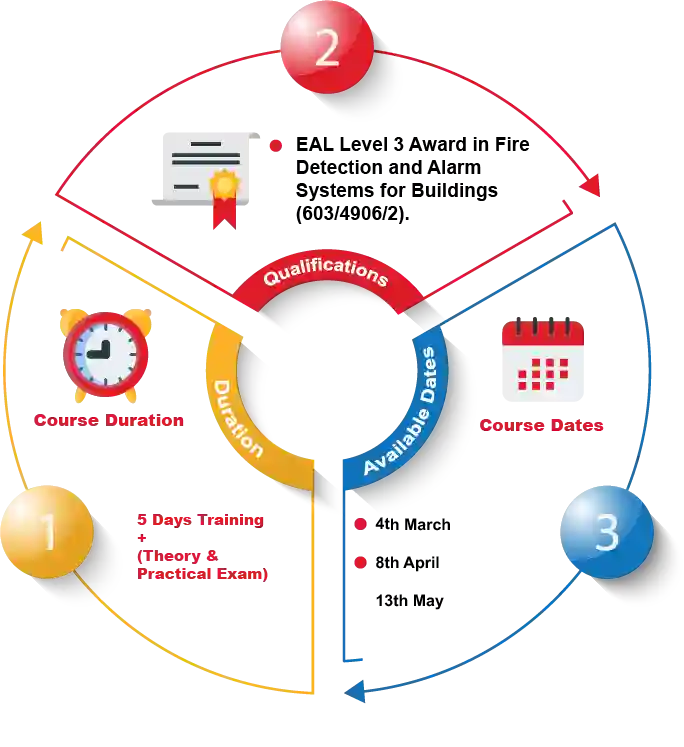£999.00

The Commercial Fire Alarm Systems Course is a 4-day comprehensive training program that provides essential skills, technical knowledge, and industry-recognised certification. This course prepares participants to work with fire alarm systems in both domestic(covers Domestic Fire Alarm Course) and commercial environments, with a strong focus on BS 5839-1:2017 — the British Standard for fire detection and alarm systems in non-domestic premises.
£999.00
The primary objective of the Commercial Fire Alarm Systems Course is to equip participants with the knowledge and practical skills needed to design, install, commission, and maintain fire alarm systems in non-domestic buildings. The course is divided into two key segments:
Participants will gain a full understanding of BS 5839-1:2017, including design principles, regulatory compliance, and system commissioning. By the end of the course, participants will be well-prepared to sit for the EAL Level 3 Award in Fire Detection and Alarm Systems for Buildings (603/4906/2).
This course is tailored for:
This course is suitable for those with little to no experience in fire alarm systems but with a basic understanding of electrical concepts.

Participants who successfully complete the course and pass the final assessment will be awarded the EAL Level 3 Award in Fire Detection and Alarm Systems for Buildings (603/4906/2). This qualification validates the participant’s competence in fire alarm system design, installation, and maintenance for commercial properties.
Exam Details
Participants can enhance their career prospects with the following opportunities:
Q1. Do I need prior experience?
Q2. What materials are provided?
Q3. Can I work while taking this course?
Q4. What if I only need domestic certification?
Q5. How do I choose between the Domestic and Commercial courses?
The Commercial Fire Alarm Systems Course provides an intensive, 4-day learning experience that combines theory with hands-on practical training. It prepares participants for careers in fire alarm system design, installation, and maintenance in commercial buildings. Upon successful completion, participants are awarded the EAL Level 3 Award in Fire Detection and Alarm Systems for Buildings (603/4906/2), positioning them for career progression and employment in the growing fire safety industry.
Whether you are a beginner or an experienced professional, this course will boost your credentials, increase your employability, and prepare you for roles in commercial fire safety.
Duration: 4 days (35 Guided Learning Hours; Total Qualification Time: 40 hours).
Call us on 01992 413503 for more dates
– Minimum age: 16 years.
– Basic literacy and numeracy skills.
– Open book multiple-choice exam.
– 50 questions, 100 minutes.
– Pass mark: 60%.
© Copyright Learn Trade Skills 2025
 by EngageBay
by EngageBay “Lorem ipsum dolor sit amet, consectetur adipiscing elit. Ut pretium tristique purus nec consectetur. Nulla feugiat eget tellus aliquam scelerisque. Sed eget luctus enim, sed mattis enim. Lorem ipsum dolor sit amet, consectetur adipiscing elit. Ut pretium tristique purus nec consectetur. Nulla feugiat eget tellus aliquam scelerisque. Sed eget luctus enim, sed mattis enim.Nulla feugiat eget tellus aliquam scelerisque. Sed eget luctus enim, sed mattis enim. Lorem ipsum dolor sit amet, consectetur adipiscing elit. Ut pretium tristique purus nec consectetur. Nulla feugiat eget tellus aliquam scelerisque. Sed eget luctus enim, sed mattis enim.”
William Goss
Electrician course
11/11/2024